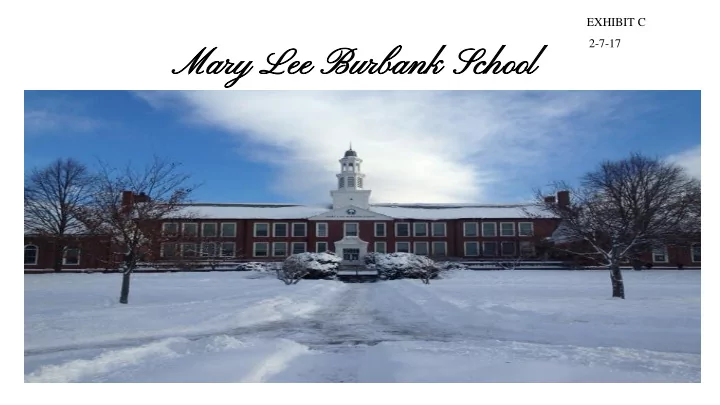

EXHIBIT C 2-7-17 Ma Mary ry Le Lee Bu Burb rbank nk Sch chool
PART A: School Enrollment
Burbank Enrollment Enrollment, October 1, 2010 327 Students Enrollment, October 1, 2016 373 Students ~+46 new students ~More complex profiles (ELL students and 504 Plans) ~Added a fourth second grade class ~General Budget (paper, toner, staples, general supplies) ~Common areas (gym, cafeteria, playground, computer lab) ~Bus (parking, drop off and pick up, staff parking) ~After School Program ~Impact on support staff (special needs teachers, RTI, office staff, nurse, guidance counselor, school psychologist) ~Difficulty finding space for TMP, ACCESS Testing, MCAS testing (library/computer lab)
PART B: INITIATIVES
Burbank School Improvement Plan 1.Completion of Open Circle Program 2.Burbank SEL Steering Committee 3.Small Group Instruction
Open Circle Open Circle provides a unique, evidence-based social and emotional learning program for elementary schools. The Open Circle program delivers interactive, in-person professional development for all school staff. Open Circle curriculum proactively develops children’s social and emotional skills, including managing emotions, empathy, positive relationships and problem solving. Open Circle helps schools build communities where students feel safe, cared for and engaged in learning.
Open Circle Curriculum Topics Strengthening Relationships Beginning Together Giving and Receiving Compliments Getting to Know Each Other Including One Another Appreciating Difference Cooperating Non-Negotiable Rules Speaking Up Nonverbal Signals Expressing Angry Feelings Managing Ourselves How to Sort Problems Being Calm Dangerous and Destructive Behaviors Listening Annoying Behavior Recognizing and Naming feelings Teasing Body Language Bullying Behavior Getting Calm When You Feel Upset Bystander and Ally Behavior Positive Self-Talk Recognizing Discrimination
Open Circle Curriculum Topics Problem Solving Identifying the Problem Deciding on a Positive Goal Brainstorming Solutions Evaluating Solutions Making a Plan and Trying It Overcoming Obstacles Being a Positive Leader
Teachers Agree that Open Circle Reduces Bullying Behavior Reduces Physical Aggression Improves Problem Solving Increases Empathy Increases Cooperation Improves Teaching Practice
What Open Circle Means to Us... “One thing I learned was speaking up” “I learned about bullies, upstanders and bystanders” “I share my ideas and listen to other people's ideas”
“I learned that if I get mad at somebody I should use calm breathing to calm down” ”One thing I have learned is not to exclude people from games” “One thing I think I learned from Open Circle at Burbank and will use next year is expressing how I feel” “Think of everyone else”
Burbank SEL Steering Committee Specific Focus: This year the SEL committee will focus on surveying the staff about any proposed changes to the Habits of Success assemblies to ensure any alignment that needs to happen between HOS and SEL standards/layers along with connecting the Open Circle themes and Burbank Core Values with the larger Burbank School Community.
Community School Meeting ~June-we had a staff meeting where we surveyed the staff about Habits of Success and ideas/suggestions/additions that we could make. ~June and August, members of the Burbank SEL Committee met and connected the work we did with Rachel Poliner to the school based SEL focus of redesigning our Habits of Success Assemblies to focus more on our core values and Open Circle. We were able to outline six meetings for the year focused on the major themes of Open Circle, and Burbank School Core Values.
Community School Meeting October 21st 1:45-2:15 (SEL Committee) Beginning Together Whole Body Listening Larry by Elizabeth Sautter November 17th 8:55-9:25 (First Grade Team) Managing Ourselves (Managing Emotions) When Sophie Gets Angry by Molly Bang December 15th 8:55-9:25 (Kindergarten Team) Managing Ourselves (Mindfulness) Silence by Lemniscates February 17th 8:55-9:25 (Third Grade Team) Strengthening Relationships (Cooperating) Swimmy by Leo Leonni or What if Everyone Did That? by Ellen Javernick May 10th 8:55-9:25 (Second Grade Team) Problem Solving (Persistence, Multiple Solutions to a Problem) The Most Magnificent Thing , What Do You Do With a Problem , by Ashley Spires May 23rd 8:55-9:25 (Fourth Grade Team) How to Sort Problems (Teasing, Bullying, Bystander) The Invisible Boy by Patrice Barton
Community School Meeting https://vimeo.com/188460538
Small Group Instruction
Small Group Instruction A two-year PLT was formed starting in the fall of This year we are focusing on Lesson Study 2015. The PLT was formed to investigate within our implementation of small group different instructional practices to improve our instruction. Lesson Study is a form of Reading Workshop, Mathematics Workshop and professional development we are using to focus on small group instruction across the improve our teaching by incorporating new ideas content areas in grade K-4. and methods. Lesson Study is an approach using a small group of educators in a The first year the focus was on research and collaborative process. It is goal driven and design. After observations, article review, and involves teachers’ regular classroom work. video research, the focus has shifted to implementation at each grade level. Including Daily 5, Daily 3 and content area integration. .
Small Group Instruction Goals: Currently… 1. Small group instruction structured around mini-lessons for the whole class and small Teachers are in full swing with Lesson Study- group lessons for the remainder of the they are first planning the mini-lessons together, workshop. then trying them out (observing each other implementing the lessons), and then critiquing 2. Meaningful work being done during the how the lesson went, both strengths and areas workshop to improve. The focus on being how to best implement small group instruction, while 3. Through using Lesson Study as outlined, fostering a workshop model. we will work together to set goals, plan, observe, debrief/revise, reflect and share. 4. Small group instruction throughout K-4, in math, reading and in content areas with integration.
Thank you!
Recommend
More recommend